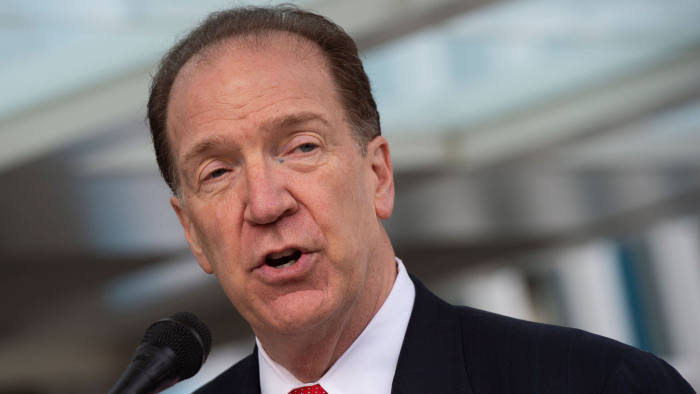The World Bank Group President, David Malpass, has expressed disappointment over Ghana and Nigeria’s decision not to sign up for the Debt Service Suspension Initiative (DSSI).
Established in May 2020, the DSSI expired at the end of December 2021.
The DSSI, put together by the International Monetary Fund (IMF) and World Bank offered countries an opportunity to freeze debt servicing, whiles they concentrate on using their minimum funds to deal with other commitments.
Mr. Malpass was responding to questions at a programme in Washington DC, on suggestions that the Bretton Wood institutions are not doing enough to help cancel the debts of some African countries in distress.
But reacting to the question, he pointed out that Ghana and Nigeria failed to apply for the DSSI, which would have provided some financial space for the repayment of loans.
“Kristalina (IMF Boss) and I were talking yesterday with the Group about the Common Framework. If countries could have a situation where the common framework clause allow the country to have a standstill on debt, that would help the country choose their path forward on debts restructuring. That would mean they would get a break on debt repayment while they work on debt restructuring,” he explained.
Mr. Malpass stated that such initiatives are designed to help reduce the impact of economic hardship on developing countries.
He, however pointed out that some developing countries refused to take advantage of the initiative to minimise the impact of the current global hardship on their citizens.
“Nigeria and Ghana both, did not ask for the common framework treatment”, he said, adding that the situation has made it difficult for such countries to overcome the negative impact of current global economic hardship on trade and currencies of developing countries.
Debt to GDP to hit 90.7% - IMF
The International Monetary Fund (IMF) had already projected that Ghana will end 2022 with a debt-to-Gross Domestic Product of 90.7%.
This was captured in its Fiscal Outlook Report released on the sidelines of the on-going IMF/World Bank Annual meetings in Washington DC, USA.
The report, also forecasts that the debt–to-GDP could reduce to 87.8% in 2023.
According to the IMF, revenue expressed as a ratio of GDP could also hit 14.1% at the end of 2022.
It will subsequently increase to 14.7% in 2023 and 15.4% in 2024”, the report said, classifying Ghana as a Low Income Developing Country.
Latest Stories
-
Togbe Afede XIV livid about state of Ghana’s economy
7 mins -
Top Republican says Trump nominees are ‘disruptors’
17 mins -
Undocumented migrants hope Trump mass deportations only ‘for criminals’
31 mins -
Final phase for mass rape trial that has horrified France
45 mins -
Trump, Musk and new cabinet nominees celebrate at UFC
57 mins -
‘Anointed by God’: The Christians who see Trump as their saviour
1 hour -
GPL 2024/25: Young Apostles hand Samartex first home defeat since March
4 hours -
Unconventional Trump brings openings and perils for Africa
4 hours -
Iseguri Initiative fights teenage pregnancy and early child marriage
4 hours -
Joy Prime’s Made in Ghana Fair closes with high praise
5 hours -
‘Dreams quashed’: Foreign students and universities fear Australia’s visa cap
5 hours -
G20 talks in Rio reach breakthrough on climate finance, sources say
5 hours -
2024/25 Ghana League: Bechem United shock Chelsea in Berekum
7 hours -
GPL 2024/25: Nations FC beat Asante Kotoko to go top
7 hours -
GPL 2024/2025: Gold Stars drop to 2nd after 2-0 defeat to Medeama
7 hours

